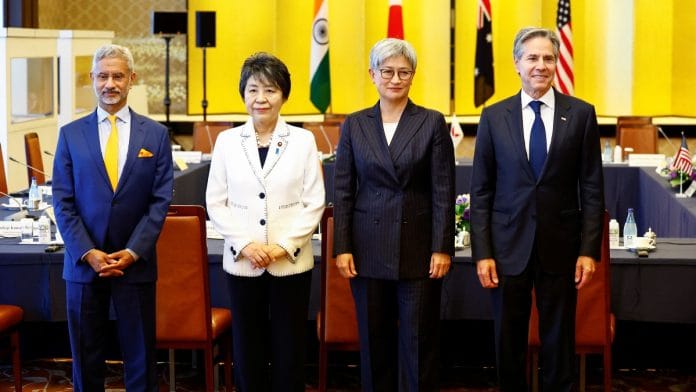New Delhi: The foreign ministers of Quadrilateral Security Dialogue (Quad) Monday took aim at China in their joint statement, defending the rights of The Philippines in the South China Sea dispute, as well as opposing any “unilateral actions” to change the status quo by “force or coercion”.
“We are seriously concerned about the situation in the East and South China Seas and reiterate our strong opposition to any unilateral actions that seek to change the status quo by force or coercion. We continue to express our serious concern about the militarisation of disputed features, and coercive and intimidating manoeuvres in the South China Sea,” said the joint statement.
It outlined the leaders’ serious concern about the “dangerous use of coast guard and maritime militia vessels, the increasing use of various kinds of dangerous manoeuvres, and efforts to disrupt other countries’ offshore resource exploitation activities”.
They said maritime disputes must be resolved peacefully and in accordance with international law, as reflected in the UN Convention on the Law of the Sea (UNCLOS).
While the statement did not directly name Beijing, the actions detailed in the statement indicated actions in the South China Sea in recent months, which has seen a series of confrontations between The Philippines and China, which seriously injured one Filipino sailor in June.
The Russia-Ukraine war, the situation in Myanmar, the Israel-Hamas conflict and also China’s aggressive actions in the East China Sea figured in the discussions held between S. Jaishankar, Yoko Kamikawa, Antony Blinken and Penny Wong in Tokyo.
The strong statement on respecting the UNCLOS and the July 2016 arbitral award in favour of the Philippines with India’s approval comes as New Delhi and Manila have in recent years seen a convergence of interests in the Indo-Pacific and border issues with China.
Earlier in July, Josel F. Ignacio, the Philippines envoy to India, told ThePrint that New Delhi was a “reliable friend” and part of a close “circle” of partners with whom Manila discusses the challenges in the South China Sea.
Speaking to the media after the meeting, Jaishankar said, “The overall messaging is that our four countries (India, Japan, Australia and the US)… all democratic polities, pluralistic societies and market economies… are working together for a free and open Indo-Pacific, for a rules-based order and for global good. That by itself is a powerful stabilising factor in an uncertain and volatile world.”
“These are challenging times, whether it is stability and security or progress and prosperity, good things do not happen by themselves. They need trusted partners, they need international cooperation — the Quad is a great contemporary example of both,” added Jaishankar.
The Quad currently has 16 working groups covering expansive areas of cooperation, from communications technology to capacity building to cooperation on counter-terrorism efforts and humanitarian assistance and disaster relief.
Also read: ‘Must ensure full respect for LAC, past agreements’ — Jaishankar tells China’s Wang Yi
On global conflicts
The conflict in Gaza found mention for the first time in a Quad statement. The four countries “unequivocally condemned” Hamas’ attacks on 7 October, 2023, calling them “terror attacks” and reiterating support for a two-state solution between Israel and Palestine.
“The large-scale loss of civilian lives and the humanitarian crisis in Gaza is unacceptable. We affirm the imperative of securing the release of all hostages held by Hamas, and emphasise that the deal to release hostages would bring an immediate and prolonged ceasefire in Gaza,” it said. “We remain committed to a sovereign, viable and independent Palestinian state taking into account Israel’s legitimate security concerns as part of a two-state solution that enables both Israelis and Palestinians to live in a just, lasting, and secure peace.”
The four leaders called for an end to the expansion of settlements by Israel, the “violent extremism” on all sides and the need to prevent any escalation in the region.
This comes two days after a rocket attack from Lebanon killed 12 people in Israel-occupied Golan Heights — the single worst attack on Tel Aviv since 7 October.
A majority of the dead were children, and Israeli Prime Minister Benjamin Netanyahu has promised retaliation against Hezbollah — the outfit Tel Aviv blames for the strike. Hezbollah denied that it launched the rocket attack.
The statement on the two-state solution and the future of Gaza, comes days after Netanyahu offered a vague future for the governance of Gaza post-war, while addressing the US Congress.
On the Russia-Ukraine war, the Quad ministers called for a “comprehensive, just and lasting peace” while also stating that “all states must refrain from the threat of or use of force against the territorial integrity and sovereignty or political independence of any state”. The statement made no direct mention of Russia.
The four foreign ministers also reiterated their support for an Association of Southeast Asian Nations (ASEAN) led solution to the conflict in Myanmar, through the implementation of the “Five-Point Consensus”.
Myanmar has been in the grip of a civil war since February 2021, when ethnic armed organisations and rebel groups launched an attack on the military-led government in Naypyitaw.
“We are also concerned about the impact that the situation in Myanmar has on neighbouring countries that are witnessing increases in transnational crime such as cybercrime, the illegal drug trade and human trafficking,” said the statement. These are concerns that India has consistently raised with the leadership of Myanmar in recent weeks.
The foreign ministers also condemned the 26/11 Mumbai terror attacks and the Pathankot assault and called for the “perpetrators of these attacks” to be brought to justice “without delay”.
“We reiterate the call for concerted action against all UN-listed terrorist groups including Al-Qa’ida, ISIS/Daesh, Lashkar e-Tayyiba (LeT), Jaish-e-Mohammad (JeM), and their proxy groups,” said the statement.
(Edited by Tikli Basu)
Also read: Modi’s 1st visit to Ukraine likely in August, as India seeks to balance ties between West & Russia






